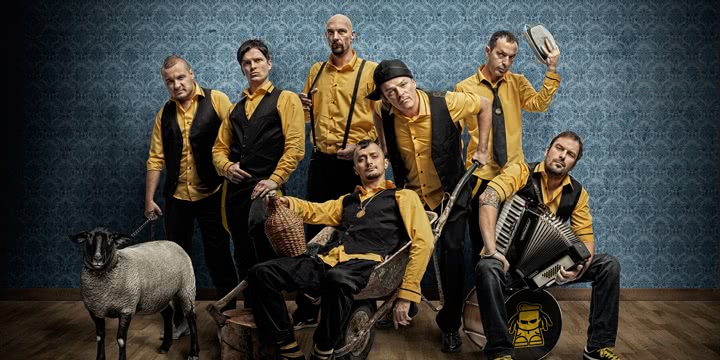As has been famously (and often) said, war is hell. While there is little good that can come from such violence, the bravery and resistance of civilians caught up in conflict can be truly remarkable.
It can also take many shapes. As Dubioza Kolektiv prepare to embark on their first Australian tour, the Bosnian band finds itself leading an unexpected charge of revitalised Balkan music. From the 1992 civil war, to what have been dubbed the ‘Bosnian Spring’ protests of 2014, Vedran Mujagic and his cohorts have learned what protest music truly sounds like.
“It’s very complex story,” Mujagic says. It is worth noting that although his reflections on Bosnia today are serious, the man himself is quick to laugh with some self-deprecating slight. “During the war – and this is extraordinary, I don’t think has happened before or after – in Sarajevo for example, a city under siege for almost four years, you had a booming cultural scene. You had hundreds of bands playing as a direct response to the situation – a genuine example of civic response to the madness that was war, and it was really something that was completely amazing. Fortunately, there is a music compilation CD called Rock Under The Siege, which has some of these bands [together] in one concert that was recorded, so there is some historical record.
“All these who were there present during the war, when it stopped and the situation started to become normal with electricity, water, supplies, everything that had been missing, they kind of lost their reason to exist. They exist in certain periods as direct response to the war, as a way of showing resistance. After, the enthusiasm was lost for some years, and people were enjoying this – what we would find out later – baseless optimism. Like, peaceful times [thinking], ‘Our lives are going to be extremely nice.’ And forward a couple of years, and you see these bands start reactivating, talking about what’s going on.
“What was also caused by the war was the music industry that was weak before the war is now virtually non-existent. Bands were trying to make it on their own, to make everything DIY. This work ethic is something that we really learned, and are applying in our own work. We try to keep everything under control, to record and design and produce ourselves. I think this is the best way to do it today. And that is a lesson from that period.”
Though the Balkans are now further removed from the horror of the Bosnia-Herzegovina war, all is not tranquil. The musicians who believed – like so many others – that a time of national rebuilding was about to unfold have begun performing once again in opposition to their far-right government. Mujagic is clearly and fiercely proud of his home, and just as Dubioza Kolektiv are committed to entertaining and inspiring their fellow citizens, so too are they hoping to act as something of a warning bell for the rest of the world.
“We look at it as a chance to speak to a wider audience,” says Mujagic. “You cannot judge success by how many festivals [you play]. If you have more media attention, you have wider audience to speak to, if more are coming to your shows, you can communicate certain messages directly to them.
“When we started, we were really talking about the situation in our country, because we had right wing populist government that were really corrupt and made our lives miserable. And moving forward 13 years, you see the rise of the right wing in Western Europe, you see Trump, you see everything with refugees from the Middle East. Instead of Balkan countries becoming more normal, you see the entire world become Balkanised. It’s making you feel more urged to speak about these things, because we really know what we’re talking about. Right wing can really fuck you up. And we have credibility because we experienced the rise of the right wing party and what they did to our country. The war and bloodshed, the refugees. That was directly caused by these events. And we are warning people today they are going in this direction. We know what we talking about.”
Though they’re certainly a politically active band, these guys are a fiery bunch of musos too. You think Balkan music, and you’ll likely conjure gypsies, accordions and Eastern European folk. But in Dubioza Kolektiv you find such a collision of influences that they are, in a sense, borderless – a ska-dub-pop cavalcade.
“It’s exactly as you say – most people never heard about [modern Balkan music],” says Mujagic. “So I guess it’s not strong enough to be known outside of the Balkan region. But there are a lot of musicians and things going on, but only locally, and only a few of these have ever tried or succeeded to get out and play abroad, to play festivals.
“Even the people who are coming to Australia are mostly those who were made famous in the ’70s and ’80s and are going there to play for the diaspora there. I can imagine for a band starting right now, they will have even worse problems then we had 13 years ago. I think the good thing is that if nothing else, DK proved it is possible to expand your audience. If opportunities to perform don’t exist in your city, then go to the next one. And this is how we managed to come to Australia!”
You can download Happy Machineby Dubioza Kolektiv here, and they play the Factory Theatre, Saturday December 24; and Woodford Folk Festival 2016/17, Woodfordia, Tuesday December 27 – Sunday January 1.



































